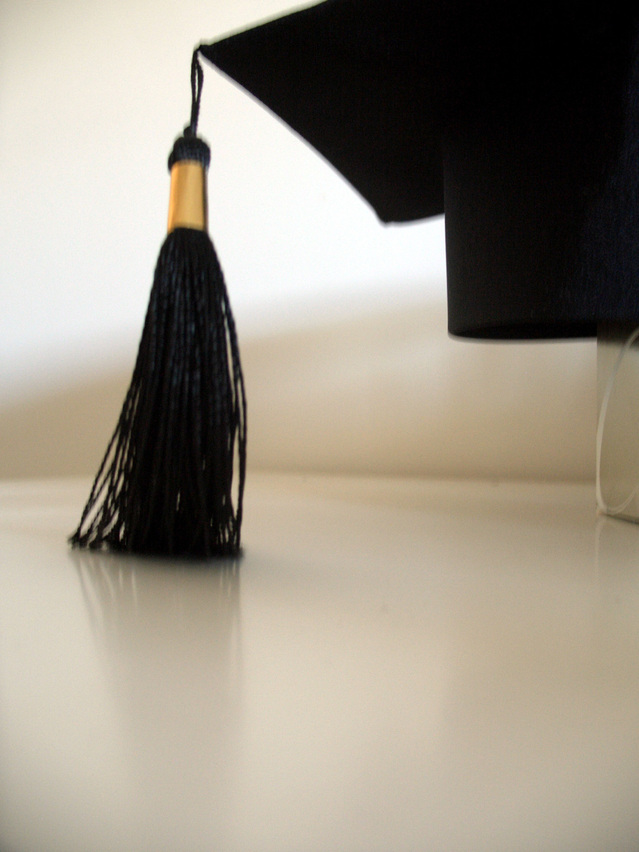Commencement ceremonies are happening at medical schools across the nation over the next few weeks. And while congratulations are in order for each and every medical school graduate walking across the stage, a few undoubtedly have earned extra accolades. Two graduates of Orlando’s University of Central Florida College of Medicine are among those who fearlessly faced tremendous odds to make their dreams of a medical career a reality: 44-year-old former US Air Force Pilot Shane Hamacher and 27-year-old Jessica Fernandez, who aims to help children battling the same rare condition that regularly leaves her 4-foot, 2-inch frame riddled with pain.
Hamacher, chosen by his peers to be the class speaker at their graduation ceremony, spent nearly 20 years in the Air Force. He had a an enviable position at the Pentagon and two children under the age of three when he decided to enter medical school, a decision that his wife supported, but many questioned.
During his speech, he revealed that he had been told matter-of-factly that his chances at being accepted into medical school or matched into ENT, his chosen specialty, at his age – twice that of the average student entering medical school – were slim to none. While that assertion might have been enough to discourage most, Hamacher drew from his military experiences and charged head-on into the challenge.
“I didn’t make it into the Air Force Academy when I first applied,” he told the audience. “While at the Academy, I was told I wasn’t pilot qualified, that I wouldn’t be going to pilot training. While I was in pilot training, I was told that I wouldn’t fly F-15s. While I was flying F-15s – I think you see the trend developing here… I’ve been told ‘no’ far more times than I’ve been told ‘yes.’ Everything of significance I’ve achieved in my life has only come to fruition on the heels of an initial setback.”
Soon, Hamacher will move his family to Kansas City, where he will begin his residency in head and neck surgery – a residence he was told he’d never get.
Also among the graduates is Fernandez, recognized by her classmates as the student who demonstrated the most perseverance throughout her education. Her small frame comes by way of spondyloepiphyseal dysplasia, a rare genetic disorder that affects bone growth and is marked by chronic hip and back pain. She uses an electric wheelchair and, prior to entering a healthcare facility, researches the building layout, the best areas to park, the locations of the elevators and the fastest routes from one ward to another. Last summer, while her classmates were on break, she traveled to Delaware to undergo a painful surgery to stabilize her cervical spine, then studied for her board exams from home while during the weeks-long recovery.
“I once met someone who told me that the only true disability is having a bad attitude,” she says, noting that throughout medical school, she opted not to let instructors know of her physical challenges in advance. “If you have a good attitude about everything, you can conquer whatever you set your mind to.”
A recent study by the University of California-San Francisco and Johns Hopkins Medical School shows that while upward of 20 percent of Americans have a disability of some kind, just 2.7 percent of medical students have a disability. This makes people with disabilities one of the most underrepresented groups in higher education nationwide.
Next up for Fernandez is training in pediatric physical medicine and rehabilitation at Jefferson Medical College’s duPont Children’s Hospital in Philadelphia, one of just three positions in the country that train doctors to care for children with movement disorders caused by conditions such as traumatic brain injury, cerebral palsy and by Jessica’s condition.
“Being able-bodied doesn’t necessarily make you a better doctor,” Fernandez says, noting that she aims to draw on her own experience to treat her patients with the kind of empathy that many other physicians are less equipped to provide. “I know what it feels like to be exposed and nervous on the cold examination table. I have been on the other side of the X-ray machine, on the inside of the MRI machine. I want to use my abilities, knowledge and expertise to find creative ways to make my patients’ lives as independent and comfortable as possible.”
We here at WOLFPACC congratulate all 2018 medical school graduates – especially those like Hamacher and Ferndandez who succeed despite the toughest of challenges. If you’re considering a medical career, call 904-209-3140 to find out how we can help give you the competitive edge you’ll need to excel.





